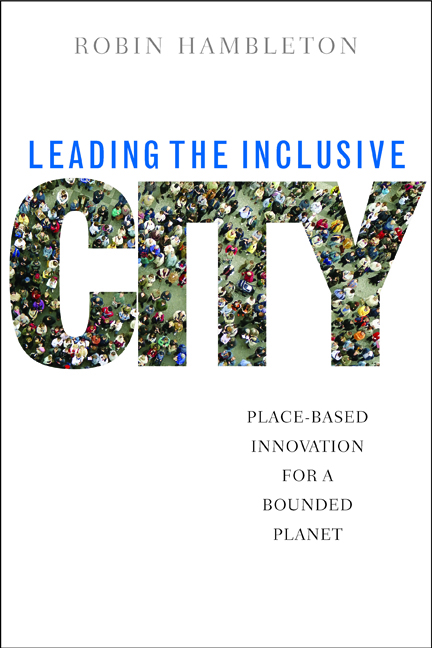Book contents
- Frontmatter
- Dedication
- Contents
- List of figures
- List of innovation stories
- About the author
- Preface
- A guide to the book
- Overview
- Part 1 Diagnosis: Understanding trends and challenges
- Part 2 Concepts: Place, leadership, innovation and democratic governance
- Part 3 Experiences: Place-based leadership in action
- Part 4 Lesson drawing: Insights and international learning
- Notes
- Appendix: International city networks and resources
- Acknowledgements
- References
- Index
Four - Understanding place and public policy
Published online by Cambridge University Press: 08 March 2022
- Frontmatter
- Dedication
- Contents
- List of figures
- List of innovation stories
- About the author
- Preface
- A guide to the book
- Overview
- Part 1 Diagnosis: Understanding trends and challenges
- Part 2 Concepts: Place, leadership, innovation and democratic governance
- Part 3 Experiences: Place-based leadership in action
- Part 4 Lesson drawing: Insights and international learning
- Notes
- Appendix: International city networks and resources
- Acknowledgements
- References
- Index
Summary
We shape cities, and they shape us
Jan Gehl, Cities for People, 2010
Introduction
A crucial argument of this book is that place should play a much more prominent role in public policy making. Place is, as I explained in Chapter 1, a neglected dimension in public policy – particularly at the national and state levels. This is because higher levels of government are disabled by departmentalism. They construct their public policies around functional domains – for example, the economy, education, health, social care, transport, agriculture, policing, energy and so on. Because departmental thinking is so deeply embedded in both the design of these government institutions and in the thought processes of the public servants they employ, political leaders are often not well served when it comes to comprehending the overall impact of public policy on particular places.
This is one of the reasons why local government is so important in modern societies. Locally elected leaders and their officials tend, on the whole, to have a more holistic understanding of the challenges particular communities are facing. For example, the socio-geographical intricacies of a city, or a neighbourhood, are more readily grasped than those of a vast territory. Also, in an important sense, local government politicians and their public servants are literally closer to the people they are there to serve. They possess tacit knowledge of what it is like to live in the place they govern.
True, city and county halls can also be victims of ‘silo thinking’ and have many imperfections. But, in my view, and I draw here on my experience of working in policy-making roles in both local and central governments, departmentalism tends to be more entrenched in the modus operandi of higher levels of government. This is partly because the realities of life at the street level are more distant. But it is also because the departmental culture generates particular ‘ways of seeing’ the world (Berger 1972). Questions and challenges tend to be framed in a departmental way and the gathering of evidence usually reflects departmental priorities and preferences.
A consequence is that the effectiveness of central government decision-making is impaired. As I noted in Chapter 1, Warren Magnusson discusses this phenomenon and suggests that national governments tend to ‘see like a state’, rather than ‘see like a city’.
- Type
- Chapter
- Information
- Leading the Inclusive CityPlace-Based Innovation for a Bounded Planet, pp. 79 - 108Publisher: Bristol University PressPrint publication year: 2014



